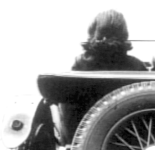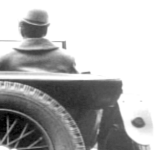For the uninitiated, The Avengers is a stylish blend of espionage, fantasy and quasi-science fiction that appeals to Anglophiles who enjoy witty, sentimental, slightly off-beat television, and don't mind terribly dated plots. While this British production acquired quite a global following back in the late sixties, it has until its recent cinematic debut been nearly forgotten, kept alive as a cult favorite by some of the baby-boomers who grew up with it.
Airing in Great Britain from January 1961 through September 1969, and comprising 161 episodes, The Avengers became one of the most popular television series of all time, eventually reaching audiences in 120 countries, a record that still stands today. Much of the show's international popularity was due to the eventual pairing of Patrick Macnee and Diana Rigg as uber-agents John Steed and Emma Peel. The Steed/Peel episodes have a formula as familiar and comfortable to fans as their favorite bathrobe. Curious events take place (usually involving murder), Steed and Emma investigate, there is a big fight, and at the end our heroes ride off into the sunset, each time via a different mode of transport. Tongue is always firmly implanted in cheek—goofy mad scientists and fiendish enemy spies abound, and their frequent plots to take over the country/world are often downright silly.
What makes all of the absurdity so endearing is the wonderful chemistry between Steed and Emma, and their droll observations on their circumstances, no matter how dire. Interestingly, some of their clever banter was written by Macnee and Rigg, who virtually invented their characters themselves, since the producers were—almost literally—making things up as they went along. Indeed, one of Macnee's favorite recollections is of an early script that said, "Steed stands there." But the director demanded he do something more than that.
Of course, there is no question that (Dame) Diana Rigg was a strong draw, especially for male viewers, but there's much more to appreciate than the eye candy she provides. Mrs. Peel is highly intelligent, strong, capable, cool and sophisticated, all of which makes her intensely interesting and an ideal role model for like-minded women. And considering the era of the show, she was way ahead of her time—somewhat ironic since, after leaving the show, both she and Honor Blackman went on to appear in Bond films.
By 1976, one of several attempts to resurrect the program resulted in 26 episodes of The New Avengers, a show muddled by stylistic disagreements between the French and Canadian backers and the British producers. Macnee's misgivings about the show are perhaps well-founded—heavy on action and violence, it has virtually none of the original's wit and charm. However, it is not without its merits, and the episodes are enjoyable if one does not view them with great expectations. The story didn't end there; twenty-one years after The New Avengers made its brief appearance, The Avengers became a motion picture that was, sad to say, a cinematic disaster by most accounts. But whatever may yet happen to it, and long after many other popular shows fade into oblivion, The Avengers will live on, immortalized in the hearts of millions—hence this website's name. |
 |
 |
All
materials copyrighted per their respective copyright holders. |